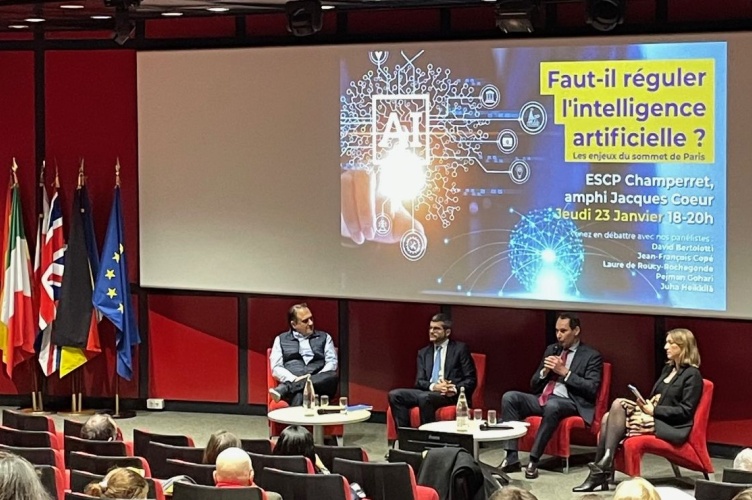Regulating Artificial Intelligence
Key Insights from the ESCP Geopolitics Institute’s First Roundtable
On 23 January, the ESCP Geopolitics Institute hosted a roundtable discussion titled “Should Artificial Intelligence Be Regulated?”. This event, moderated by Professors Maxime Lefebvre and Vanessa Strauss-Kahn, Co-Directors of the ESCP Geopolitics Institute, brought together leading figures from politics, business, and academia to debate one of the defining issues of our time: how to govern the rapid rise of artificial intelligence (AI) while managing its profound societal, economic, and geopolitical impacts.
The panel featured:
- Jean-François Copé, former Minister and Mayor of Meaux, who examined AI’s AI’s influence on democracy and governance, particularly in relation to misinformation and electoral integrity.
- David Bertolotti, Deputy Secretary General at the French Ministry for Europe and Foreign Affairs, emphasised the geopolitical stakes of AI governance and provided insights into the upcoming Paris AI Summit (10–11 February).
- Laure de Roucy-Rochegonde, Director of the Technology Centre at IFRI, focused on the necessity of international AI governance, a subject on which she is currently preparing a policy paper.
- Juha Heikkilä, Adviser at the European Commission’s DG CONNECT, outlined the EU AI Act and discussed its potential to shape global regulatory frameworks.
- Pejman Gohari, AI expert and author, explored how businesses must take a proactive role in ethical AI development and governance.
Key themes from the discussion:
- AI as a Global Power Play: AI governance is not just a technical issue—it is at the heart of geopolitical competition. Laure de Roucy-Rochegonde highlighted how different regulatory approaches reflect broader international power struggles. The US leans towards market-driven AI innovation, China employs a state-controlled model, and the EU is positioning itself as a regulatory leader with the AI Act, aiming to set global standards for AI governance.
- Beyond the Regulation vs. Innovation Debate: A central takeaway from the discussion was the need to move past the perceived contradiction between regulation and innovation. Juha Heikkilä argued that the EU AI Act adopts a risk-based approach, ensuring that high-risk AI applications face greater scrutiny while allowing space for innovation. Jean-François Copé cautioned that overly restrictive frameworks could push European companies towards less regulated markets, particularly in the US and China. The panel agreed that well-designed regulation can, in fact, drive innovation by creating a stable and trusted environment for AI development.
- The Paris AI Summit and Global Governance Challenges: David Bertolotti underlined the critical role of the Paris AI Summit (10–11 February), where international stakeholders will discuss ways to harmonise AI governance on a global scale. He noted that fragmented regulatory approaches risk creating conflicting standards that could hinder international cooperation. Similarly, Laure de Roucy-Rochegonde stressed that AI governance must be truly global, rather than dominated by a handful of powerful actors. Her upcoming policy paper will further explore this issue.
- AI’s Societal Risks: Surveillance, Misinformation, and Job Displacement: The discussion also covered the ethical and social consequences of AI. Jean-François Copé highlighted the dangers of AI-driven misinformation, referencing China’s social credit system as an example of how AI can be used for mass surveillance. David Bertolotti pointed out that AI governance must address broader societal issues such as workforce automation and access to AI-driven technologies. The panel stressed the importance of a global, multi-stakeholder approach to ensure AI benefits society rather than deepening inequalities.
- The Role of Business in AI Regulation: Businesses are at the forefront of AI development, and Pejman Gohari called for greater corporate responsibility in shaping AI governance. He argued that while governments set the rules, companies have a duty to ensure transparency, fairness, and accountability in AI deployment. The discussion also touched on the role of public-private partnerships in fostering innovation while mitigating AI’s risks.
A Platform for Critical Dialogue
This roundtable was the first in a series of events hosted by the ESCP Geopolitics Institute, designed to bridge academic research with policy and practice. By convening experts from diverse fields, the Institute reaffirmed its role as a hub for meaningful debate on global challenges at the intersection of geopolitics, economics, and technology.
Campuses
